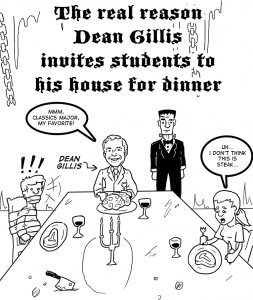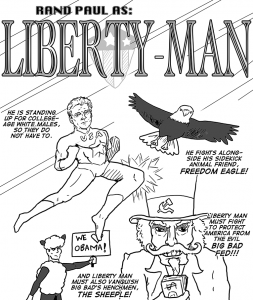What I heard at dinner on the first night of spring break was hard to believe. A group of seven other Georgetown students, two leaders from Campus Ministry and I spent the break in El Salvador as part of the “Magis Immersion and Justice Program,” and to kick off our trip we went to a small restaurant with our guide and bus driver. I was practicing my Spanish and chatting with our driver, Santos, about how much I was looking forward to the week. It was Santos’ response that took me by surprise. Rather than returning my excitement or laughing along with me, he became very solemn and told me this would be one of the most important weeks of my life. He told me that our group would be learning and seeing so much during our time there that our lives would be changed afterward. I found Santos’ statement touching, but couldn’t help but think he was being a little dramatic. I knew I would be exposed to different lifestyles and challenges during the trip, but it seemed unlikely that one week could change my life.
However, our week in El Salvador was a truly humbling experience. In those seven days I saw a shocking amount of poverty and corruption. For example, we came to accept the fact that the ARENA party in control of the Salvadoran government transports Honduran and Nicaraguan citizens across its borders to vote on election days and has been known to buy the votes of Salvadorans for as little as the eqivalent of $5. Everyday we visited different communities and Salvadoran NGOs to learn about challenges that face the Salvadoran people, which range from unemployment and hunger to not having access running to water or electricity.

The day that we made a visit to San Ramon and attended their Sunday service stands out in my mind. Although it was otherwise a normal Catholic mass, it was compelling because the homily was a discussion forum rather than the priest giving a speech. The discussion centered around the scripture, the story of Jesus giving sight to a blind man, but nearly everyone who spoke addressed their comments to our group and other American delegations at the mass.
I found it incredible that even though it had been nearly 20 years since the end of El Salvador’s civil war, the majority of the villagers who spoke made some reference to its effects, explaining that our eyes would be opened in the coming week to the oppressiveness of their government and the extreme poverty most Salvadorans live in. As someone who doesn’t find mass moving very often, I was surprised to find myself choking back tears. In addition to continuously thanking us for visiting them, the parish members kept telling us that we gave them hope for a better El Salvador because as young American students, they said, we have the power to change our country and the U.S. has the power to change the world. One man told us, “Tienen que ser nuestra voz”: You have to be our voice.
Their statements scared me. Like many students at Georgetown I have always wanted my life and work to have a positive impact on the world, but another person telling me they were relying on me to do so was a new and intimidating experience.
Our group also spent three days living with families in a rural village called Santa Monica. Most of the members of our group used a latrine and took bucket showers because the houses didn’t have indoor plumbing. These families and the community were living purely on a survival basis. Each day, the families focused on getting enough food and doing enough work on the communal farm to earn a small income, something unimaginable for most Georgetown students.
What I will never forget about Santa Monica is saying goodbye to a girl who lived in the village. I’m embarrassed to say all I know about her is that she was probably around the age of 17 or 18; I don’t even know her name. I met her the morning of our departure when I went to her family’s house with other members of the group to learn how to make tortillas. As we prepared to leave Santa Monica she was the last person I politely hugged and thanked for welcoming us to the community. As I pulled away from the hug she held on longer, looked me in the eye, and told me something I was unable to understand a single word of except for the initial, “Gracias.” From the expression on her face I know she was telling me something important and heart-felt. I didn’t need to understand her words to know that the few days we spent with her community meant a lot to her —she said that in the way she continued to hug me far beyond the point of just being polite.
Because many of us are accustomed to service trips, the importance of a trip that involved stepping back, learning and thinking rather than doing was hard to grasp. At times I felt like our goals were insignificant, and could never have the tangible effects of building a house, for example. At times I even felt guilty. But we learned that providing spiritual support and assuring people that we wanted to help them was just as important to the people we met as doing some sort of community service would have been. I saw this message in the eyes of that last girl I said good-bye to, and I understand now that because we took the time to understand the challenges facing Salvadorans we are now ready to start working to make sustainable changes .





